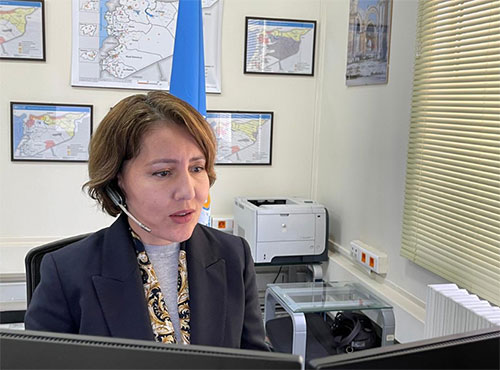WHO EMRO Virtual Press Conference, 14 April 2021 (13.00 Cairo time)
Overall situation
 Last month marked one year since the first reported COVID case in Syria. It also marked 10 years since the start of the ongoing Syrian crisis. Compared to war and starvation – 12.4 million people in Syria are food insecure, a 25% increase in the past months - the pandemic seems benign to many Syrians. This wrong impression may also be due to the fewer number of COVID-19 cases detected and announced so far. As of the today, there are 54,308 confirmed cases and 2,451 deaths. It is in no way the real state of affairs.
Last month marked one year since the first reported COVID case in Syria. It also marked 10 years since the start of the ongoing Syrian crisis. Compared to war and starvation – 12.4 million people in Syria are food insecure, a 25% increase in the past months - the pandemic seems benign to many Syrians. This wrong impression may also be due to the fewer number of COVID-19 cases detected and announced so far. As of the today, there are 54,308 confirmed cases and 2,451 deaths. It is in no way the real state of affairs.
This is mainly a result of inadequate laboratory testing and local surveillance capacities, lack of equipment, supplies and reagents. For WHO to provide epidemiological evidence, generate predictions and mitigate risks, we need more data, and our first priority is to strengthen testing capacity.
As I speak, Syria is witnessing the 3rd wave of COVID-19, presence of multiple variants of the virus.
I acknowledge a delicate balance between protecting the economy and introducing public health measures to reduce transmission. This becomes an ethical dilemma in the Syrian context, especially when for some it means to lose livelihoods. More than 90% of the population is living under the poverty line, compared to 28% in 2010.
While Syria fights COVID-19 in the context of continued hostilities, with a crippled public health capacity to cope, today we are witnessing more livelihoods and lives lost. The country and its people are pushed to even deeper devastation, economy driven further down over the past year:
Half of the work-age population is now unemployed; hundreds of thousands of jobs lost since the beginning of the pandemic.
Remittances, on which millions of Syrians rely, have halved due to global and regional economic contraction. [from US $1.6 billion in 2019 to $800 million in 2020].
The Syrian pound is in virtual freefall having lost 78% of its value in a year, accompanied with 236% price increase of average food basket.
Humanitarian needs are increasing.
Over 12.4 million people are in need of health aid, especially people living in camps and camplike settlements.
1/3 of the population are IDPs.
COVAX Vaccines
Syria is 1 of 92 countries eligible for advanced market commitment under COVAX facility, a platform co-led by WHO, CEPI (Coalition of Epidemic Preparedness Innovation) and GAVI (Global Vaccine Alliance). We have been working with UNICEF and COVAX facility, and partners, to make vaccines available throughout Syria with the aim to cover 20% of the population by end of 2021.
National deployment plan prioritizes high risk groups equitably across all administrative areas. The plan under COVAX is to cover 20% of the population in two phases: 3% in the first phase by end of June 2021 and 17% by end of December 2021. As elsewhere in the globe, health workers will be the prioritized for the first vaccine doses. Important to note that in Syria, over half of the health care workforce fled the country since the conflict began, the remaining medical staff struggle to cope with the overwhelming health needs, while continuously surviving the pervasive threat of kidnapping and targeted attacks . Without health workers, no health care can be ensured. They must be prioritized first.
WHO has been present in Syria throughout most difficult times and operates, based on its principles of independence, impartiality and neutrality. For vaccination, we will use all modalities approach to reach high risk groups. The vaccine distribution will be channeled using institutional memory and platform of the current national vaccination by the MOH, that includes crossline shipments for NES, as well as we will use crossborder operation for vaccination in NWS, from Gaziantep.
COVAX has allocated AZ SII for the first batch of vaccine shipment to Syria and we are counting the last mile to bring vaccines. The pathway is not without challenges and we need continued support from the international community not only to cover immediate vaccine administration costs but also to support the work of WHO in Syria as a provider of last resort in one of the most complex emergencies in the world.
1 Recent attack on health – Al Attareb surgical hospital, 16 injured, 4 dead; in busy neighborhood of Aleppo city 14 injured and 2 dead after hostile exchanges




